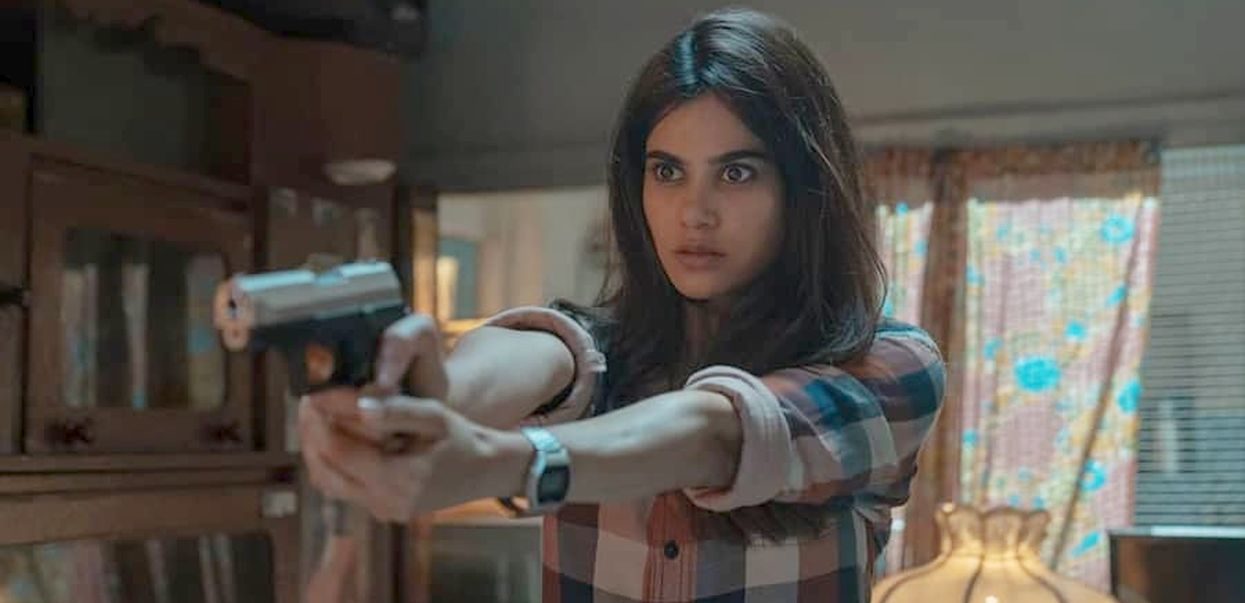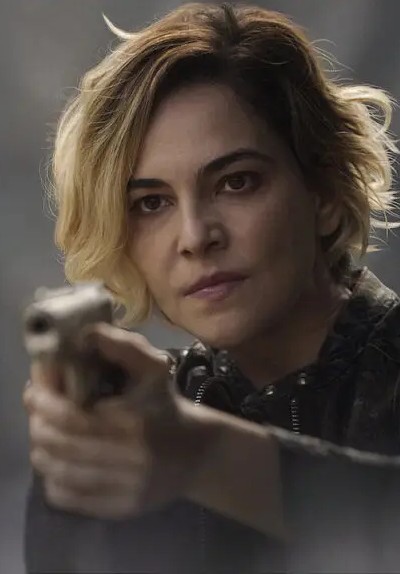★★½
“Not so bag.”
 Back when I reviewed The Bag Girls, I was not particularly impressed and spent a fair bit of time riffing off the lead actresses’s names, which says a lot about how forgettable the film was. I expected more of the same here, but especially toward the end, there was some indication of genuine progress. While we’re still not talking great, there were positives, which deserve to be acknowledged. You likely do need to have seen the original, as this assumes you know who the characters are: Dee (The Doll) , Nola (The Boss) and the rest of the quartet are still robbing for a living, sporting bejewelled masks, and referring to each other by high-end handbag names. However, trouble hits when a strong-box they loot turns out to belong to Colombian cartel queen, Solera Castillo (Garcia), who is not happy with this apparent disrespect. Meanwhile, the authorities, particularly in the form of Detective Lewis (Wilson), are also on the trail of the Bag Girls.
Back when I reviewed The Bag Girls, I was not particularly impressed and spent a fair bit of time riffing off the lead actresses’s names, which says a lot about how forgettable the film was. I expected more of the same here, but especially toward the end, there was some indication of genuine progress. While we’re still not talking great, there were positives, which deserve to be acknowledged. You likely do need to have seen the original, as this assumes you know who the characters are: Dee (The Doll) , Nola (The Boss) and the rest of the quartet are still robbing for a living, sporting bejewelled masks, and referring to each other by high-end handbag names. However, trouble hits when a strong-box they loot turns out to belong to Colombian cartel queen, Solera Castillo (Garcia), who is not happy with this apparent disrespect. Meanwhile, the authorities, particularly in the form of Detective Lewis (Wilson), are also on the trail of the Bag Girls.
It’s a reasonable enough plot, and when the film sticks to this, it’s quite watchable. Women take the lead on the three corners of the story-line’s triangle, anchored by decent performances from those involved. It all ends up in the Bag Girls taking the fight to Castillo’s mansion, after she has begun extracting her own vengeance, while Lewis awaits the arrival of backup. I can’t complain about the imagery of Solera, rising out of her hot-tub to spray automatic gunfire at her attackers, wearing an expression Harley Quinn would likely deem excessively enthusiastic. Though she and the Bag Girls really need to focus on their accuracy, possessing skills that would get them kicked out of Imperial Stormtrooper school. However, the film’s reliance on digital muzzle flashes and CGI blood (if at all), resulting in no property damage is disappointing, though likely inevitable given the budget here still is on the low end.
The problem is the film takes way too long to get to the good stuff, diverting en route to far less interesting subplots and side-stories. There’s an entire separate robbery of some rapper’s party, that is neither necessary to the plot, nor staged in ways that are even slightly interesting. I must also say, the music in large part feels remarkably bland; while I’ve criticized this kind of film before for an excessive reliance on obvious music, this does need something with a harder edge to fit the tone. I do also suspect that, if the events at the end unfolded in real life, a Latin drug cartel would be unlikely to allow the perpetrators to skip away to enjoy drinks on a Mexican beach. Maybe I’ve just seen too many episodes of Ozark. Though this is not about “real life” in the slightest, more a glammed-up version of the gangster lifestyle. If still lacking the resources to sell that dream, everyone involved seems to have made progress from last time, and if not eagerly anticipating Bag Girls 3, I’m not dreading it.
Dir: Wil Lewis
Star: Crystal The Doll, LA Love The Boss, Jenicia Garcia, Chevonne Wilson





 ★★★½
★★★½ An early contender for widest gap between synopsis and reality in 2024. On the one hand, we have “After years of torment, Peggy finally gets revenge on all those who wronged her in the past.” On the other? A dumb, microbudget not-a-horror, not anything really. It’s probably most notable for the unexpected appearance of Tom Lehrer on the soundtrack. I guess the basic concept is there. Peggy (Van Dorn) is almost thirty, but still lives at home with her doting dad (Williams). Her main hobby is abducting and torturing those who “wronged her” – though quite what they did to deserve such punishment is never made clear, which makes it kinda hard to feel empathy for her.
An early contender for widest gap between synopsis and reality in 2024. On the one hand, we have “After years of torment, Peggy finally gets revenge on all those who wronged her in the past.” On the other? A dumb, microbudget not-a-horror, not anything really. It’s probably most notable for the unexpected appearance of Tom Lehrer on the soundtrack. I guess the basic concept is there. Peggy (Van Dorn) is almost thirty, but still lives at home with her doting dad (Williams). Her main hobby is abducting and torturing those who “wronged her” – though quite what they did to deserve such punishment is never made clear, which makes it kinda hard to feel empathy for her. I’ll treat these two seasons as one entity. Indeed, there’s a case to be made that you could include
I’ll treat these two seasons as one entity. Indeed, there’s a case to be made that you could include  Based on the trailer, I was hoping for something like a Korean version of The Transporter. It seemed to promise this, with Jang Eun-ha (Park) playing a courier for Baekgang Industries, a company who will transport things – mostly people, it appears – from Point A to Point B, when regular delivery methods are not possible. For example, because the passenger in question is being chased by enemies, and needs to make a quick exit from the country before he’s found. Her latest mission involves baseball pitcher Kim Doo-shik, who has blown the whistle on a match-fixing scandal, so needs to escape before those behind it get hold of him and young son Kim Seo-won (Jung).
Based on the trailer, I was hoping for something like a Korean version of The Transporter. It seemed to promise this, with Jang Eun-ha (Park) playing a courier for Baekgang Industries, a company who will transport things – mostly people, it appears – from Point A to Point B, when regular delivery methods are not possible. For example, because the passenger in question is being chased by enemies, and needs to make a quick exit from the country before he’s found. Her latest mission involves baseball pitcher Kim Doo-shik, who has blown the whistle on a match-fixing scandal, so needs to escape before those behind it get hold of him and young son Kim Seo-won (Jung). I was expecting this to be a follow-up to the previous Giantess films, most recently
I was expecting this to be a follow-up to the previous Giantess films, most recently  This is fairly sparse, unfolding entirely in the single location of a furniture factory, over the course of a single night. The central character is Karen (Terrazzino), a single mother who has just taken on the job of a cleaner and overnight security guard at the premises, in order to provide for her young daughter, who is ill on the night Karen has to start work. These issues quickly pale into insignificance – though not irrelevance – when a group of masked men enter the building, looking to hunt down and kill her. With the doors chained from the outside and the phone lines cut, Karen is entirely on her own against the bigger and stronger, but fortunately not smarter, intruders.
This is fairly sparse, unfolding entirely in the single location of a furniture factory, over the course of a single night. The central character is Karen (Terrazzino), a single mother who has just taken on the job of a cleaner and overnight security guard at the premises, in order to provide for her young daughter, who is ill on the night Karen has to start work. These issues quickly pale into insignificance – though not irrelevance – when a group of masked men enter the building, looking to hunt down and kill her. With the doors chained from the outside and the phone lines cut, Karen is entirely on her own against the bigger and stronger, but fortunately not smarter, intruders. This ended up turning into an Internet investigation. The title above is the one by which it appeared on Tubi. But it’s clearly pasted onto the opening credits, and I ended up having to go through the IMDb credits for the one identifiable actress to find it there – where it appears under another title, with some promo materials giving it a third name. The end credits are entirely in Chinese, and provide absolutely no information as to who is playing who. So that also had to be pieced together. But least helpful of all, were subtitles that may be generated by a drunk AI, operated by a seven-year-old
This ended up turning into an Internet investigation. The title above is the one by which it appeared on Tubi. But it’s clearly pasted onto the opening credits, and I ended up having to go through the IMDb credits for the one identifiable actress to find it there – where it appears under another title, with some promo materials giving it a third name. The end credits are entirely in Chinese, and provide absolutely no information as to who is playing who. So that also had to be pieced together. But least helpful of all, were subtitles that may be generated by a drunk AI, operated by a seven-year-old Yes, let’s get the obligatory Kurt Cobain joke out of the way quickly and painlessly. This is instead about the Kurdish city, located in northern Syria, which came under assault from forces belonging to the Islamic State (ISIS) in 2014-15. The defenders eventually repelled the attack in what has been called the Kurdish version of the Battle of Stalingrad. Even before that, we had
Yes, let’s get the obligatory Kurt Cobain joke out of the way quickly and painlessly. This is instead about the Kurdish city, located in northern Syria, which came under assault from forces belonging to the Islamic State (ISIS) in 2014-15. The defenders eventually repelled the attack in what has been called the Kurdish version of the Battle of Stalingrad. Even before that, we had  This is the story of Syrian sisters Yusra Mardini and her sister Sarah, played by real-life sisters Nathalie and Manal Issa. Growing up, they were trained by their father, a professional swimmer himself, and had the goal of reaching the Olympics for their country. The (still ongoing) Syrian Civil War led to the sisters leaving their homeland, and this is mostly the story of their journey, through Turkey, across the Mediterranean in a
This is the story of Syrian sisters Yusra Mardini and her sister Sarah, played by real-life sisters Nathalie and Manal Issa. Growing up, they were trained by their father, a professional swimmer himself, and had the goal of reaching the Olympics for their country. The (still ongoing) Syrian Civil War led to the sisters leaving their homeland, and this is mostly the story of their journey, through Turkey, across the Mediterranean in a